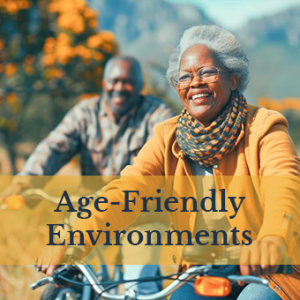
Rich or poor, investing in care pays off: Long-term care success stories from Slovenian communities
Presenter:
Ana Ramovs, Anton Trstenjak Institute of Gerontology and Intergenerational Relations, Slovenia
Abstract
In the 21st century, two important phenomena have made a significant impact on the field of care for frail, disabled or chronically ill members of the community. First phenomena are the demographic change leading to an ageing population, which have severe effects on requirements and provision of long-term care. Second is the need for new social models of solidarity between generations, due to the radically changed domestic situations compared to traditional models of coexistence. Addressing these challenges requires action at all levels—individual, local, and national—with the community level playing a key role in implementation.
Coordinated by the Anton Trstenjak Institute of Gerontology and Intergenerational Relations, the Slovenian Network of Age-Friendly Cities and Communities cates back to 2010. As an affiliate program of the World Health Organization (WHO), the Network’s mission is to promote the exchange of good practices and experiences in age-friendly environments across Slovenia, and to support their ongoing development within the national context. It offers professional assistance to communities in implementing the WHO’s four-step cycle—from needs assessment to evaluation—and in designing locally tailored soft programs that foster participation and progress across various age-friendly domains. Central to this effort is the belief that being an ‘age-friendly community’ must go beyond a symbolic title—it must reflect a genuine commitment to meaningful engagement by member communities.
Recognizing the above-mentioned challenges in the field of care, over the recent years special attention was given to developing the long-term care field as part of the healthcare domain. This presentation will outline the structures, steps, and key elements involved in supporting Slovenian municipalities in enhancing local long-term care provision. Drawing on concrete examples from municipalities with varying levels of resources, it will showcase multiple pathways for community-led development—ranging from support for informal carers and home care services (including innovative models like the PROCAREFUL hybrid approach to digitalization), to investments in community and co-housing centers, partnerships with local care institutions, workforce development strategies, and public awareness initiatives aimed at reshaping perceptions of care. The presentation highlights that, while financial resources are important, there are many viable ways to strengthen long-term care at the local level—and that regardless of an environment’s wealth, investing in care always pays off.
Bio(s):
Ana Ramovs is medical doctor, specialized in EM and gerontologist. She works in Community Health Centre Ljubljana and at Anton Trstenjak Institute of Gerontology and Intergenerational Relations, Slovenian national gerontological institute. At the Institute she works as researcher and developer in the fields of LTC, healthy and quality ageing, preventive medicine and ethics. She is coordinating Slovenian network of AFCC and helps to lead Slovenian association of informal carers, represents the Institute in international networks and is in charge of international projects. She has experiences with group work and is developing and conducting trainings in the field of ageing and LTC. On this subject she published Frontiers methodological article Informal Carers Training: In group Social Learning as an Effective Method for Quality Care Empowerment. She is co-author of Towards Alpine Age-Friendly Environment toolkit, author of Healthy old age manual, one of the co-authors of the Falls prevention manual and other Slovenian and foreign publications.
https://www.inst-antonatrstenjaka.si/institut/
